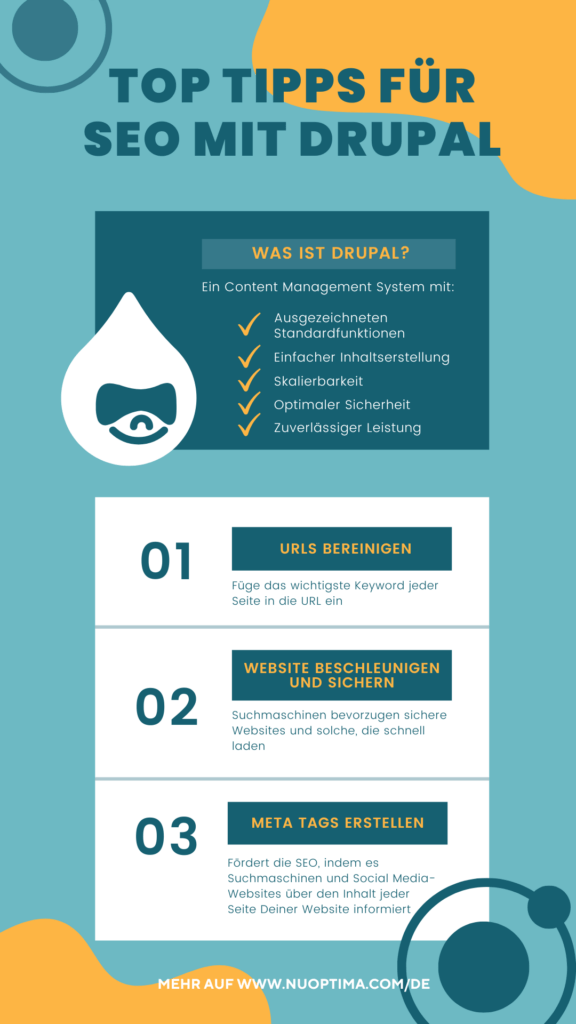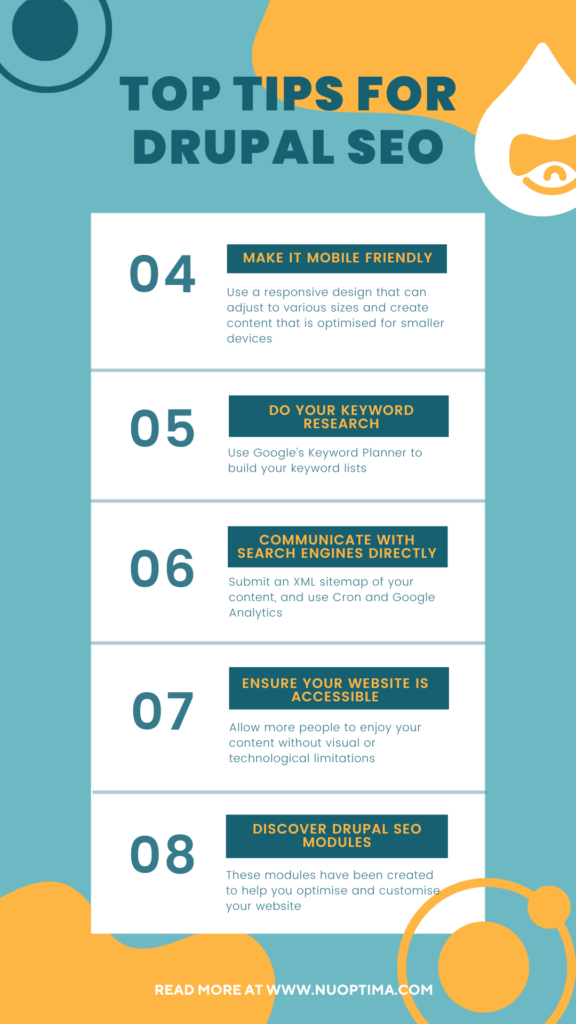Read NUOPTIMA’s top tips for promoting a Drupal website here and sign up for a free 15-minute discovery call with our experts if you’re interested in hiring a professional SEO agency for promoting your website.
Key Points
- Drupal is a free, open-source content management system used to build applications and websites. Drupal SEO is an effective marketing strategy used to draw traffic and increase sales.
- Some of our top tips for conducting Drupal SEO include cleaning up URLs, making your website accessible and mobile-friendly, speeding up your website, and using Drupal modules.
- SEO can be challenging when tackled alone, especially as Drupal requires some technical knowledge. For this reason, we highly recommend using the services of an excellent, reputable SEO agency
What is Drupal SEO?
Drupal is a content management system, also known as CMS. It is used to create many websites and applications that you use every day. It is known for its excellent standard features, simple content authoring, scalability, fantastic security, and reliable performance. It is also notoriously flexible: one of its main principles is modularity. You can build both structured and versatile content. Drupal is free and an open-source CMS. Unlike other options like Wix, Drupal requires more technical knowledge but also allows far more customisation. Because of this, people who use Drupal tend to have some knowledge of coding and basic CMS tools.
SEO is search engine optimisation and is a marketing strategy used to improve both the ranking and visibility in search engine results. Therefore, Drupal SEO is a strategy used to improve the ranking of Drupal websites. There are various techniques involved with SEO, such as keyword research and content marketing, and these techniques assist a website in appearing higher up in search engine results.
There are other options you can use to increase traffic, such as through pay-per-click adverts (PPC) and social media marketing. But, while these options give results as soon as you start paying for adverts, they are also expensive and do not give you long-term benefits. On the other hand, SEO takes a few months to begin displaying results, but the position of your website will improve, and these positions can be maintained so you can enjoy free traffic indefinitely. This is one of the numerous reasons SEO is viewed as a better option.
Drupal is designed to be conducive to SEO, and indeed it encourages site builders to implement good SEO practices into their work.
Top Tips for Drupal SEO
If you’ve worked hard to build a custom website, you will want customers to find you on search engines. In this section, we offer you some of the best top tips to ensure your content can be crawled and seen by both search engines and users.
1. Clean Up URLs
Your URLs are vital for SEO. URLs that have specific words that represent the actual content of that page will rank higher. For Drupal SEO, go into your website settings and click ‘enable clean URLs’. This lets you change URLs to reflect the individual page content instead of a URL made up of randomised numbers and letters. It can be a wise idea to use a URL similar to that of the title of the page. This way, the URL is more contextual. It is also recommended to include the primary key term that your page targets in your URL itself. This tip is important because you need to make sure your website is showing the right content and that link value is maintained even when the content changes. There are also some modules you can use to edit your URLs:

- Redirect module: The Redirect module lets you redirect old URLs to new ones. This is particularly useful when you have moved a piece of content to another section of your website or accidentally changed the URL. This helps SEO as it ensures that any URL that ranks on Google will still resolve when a user arrives. This module automates fixing broken links.
- Pathauto module: Using the Pathauto module, Drupal automatically generates URLs for your content that is fantastic for SEO, meaning you do not have to create every single content URL on your site manually. Essentially, it makes sure that your URLs are search engine friendly.
2. Speed Up and Secure Your Website
Two of the most essential attributes of your website are its speed and security. Google favours websites that are both secure and fast to render. In terms of speed, if a website is slow and it takes too long for a search engine to crawl, search engines will not want to present it to their audience. Speed became a ranking factor for Google in 2010. Therefore, to check the speed of your Drupal site, you can go to the performance area of your admin account. You can also use Google’s PageSpeed Insights to see how well your website is doing.
Turning to security, there is no point in spending time and effort in SEO if your site can easily get hacked. Plus, search engines prioritise privacy and safety on the internet, so they give preference to secure sites. To check if your website is secure, look at the URL in your browser. The lock icon and the ‘s’ in ‘https’ will tell you if a website is secure
3. Provide Meta Tags
Meta tags are important when it comes to making Drupal as effective as possible. Put simply, meta tags are snippets of texts used to inform search engines and social media websites about the content on each page of your site. This assists SEO by clearly communicating what you think each page on your website is about and how you want it to be described on their websites. Without meta tags, you will have to rely on the search engines themselves to make their own minds up about your content. Here are a couple of modules that might be worth using:
- Metatag module: This lets you automatically provide structured metadata and title tags to every page of your website. It places both meta tags and the HTML title tag in the header of a web page. This equates to less code and quicker rendering of your pages, and this can also help with SEO.
- Hreflang module: Search engines use tags to serve the correct language or regional URL in search results. Hreflang automatically adds these tags to your pages based on your website’s enabled languages and the language switch links provided by core.
4. Make It Mobile-Friendly
Search engines such as Google prioritise mobile-friendly sites because so many searches are now occurring on mobile devices, and they want their users to have the best experience. One of the best ways you can ensure your Drupal website is mobile-friendly is by making it responsive. Consider whether text, images, and the overall layout of your site morph depending on the browser size.
Because there are now so many different sizes of mobile phones, well-designed sites use a responsive design that can adjust to various sizes. However, Drupal SEO is not just about responsive design. It is also about creating content that is optimised for smaller devices as well as access on the go. It is important to have a ‘mobile-first’ mindset. A couple of top tips to make your website more mobile-friendly include:
- Avoid adding too many popups as this can disrupt the mobile experience.
- Think vertical instead of horizontal when it comes to your website design. Create ‘stacked’ designs.
- Utilise headings, lists, bullet points, and images to ensure the content is easier to scan through.

5. Do Your Keyword Research
It is crucial that you incorporate relevant keywords into content and page copy so you can draw your audience into your website and give them the information they need. To ensure that you use the correct keywords and phrases, you need to conduct thorough keyword research. You need to discover what people actually search for and the terms they use to help your website appear higher up in relevant searches. A good tool for this is Google’s Keyword Planner to help you build your keyword lists.
Once you have a confident idea of the keywords that your target market is using and what they are searching for, you can then create content that attracts them to your website. It’s not rocket science: websites that optimise the best are those that deliver content that people care about on a regular website. You should incorporate your keywords naturally. Sprinkle them throughout your content, place them in relevant URLs, use them in headlines, and drizzle them into page descriptions.
6. Communicate with Search Engines Directly
Search engines want you to be able to communicate with them to help them crawl and index your website. To do this, they provide tools and reports to help you understand what is going on with your website and to communicate with them better. People who do this well will experience better search results and witness better traffic. Here are a few tools you can use to accomplish this:
- XML Sitemap module: An XML sitemap is a specially formatted summary of every piece of content on your website. This module creates an XML sitemap of your content that can then be submitted to search engines. Having an XML sitemap helps your SEO efforts by presenting Google with a list of all the pages you wish them to crawl. While Google can do this without a sitemap, the bigger and more complex your site becomes, the more likely a search engine’s crawler will get confused and potentially miss pages or sections of the site.
- Cron: Cron is a system that cleans up and maintains your Drupal site. Among other things, it indexes content, rebuilds XML sitemaps, and checks for updates. This means your XML sitemap will stay up to date with any new content that you add to your site.
- Google Analytics: This allows you to find valuable insights into your website visitors, such as behaviour on your website, demographics, keywords used to find you, and so on. This can be a great way to determine what can be improved upon to attract more traffic.
7. Ensure Your Website is Accessible
Search engines consider the accessibility features of a website when ranking them in their search results. They give priority to those that check all the accessibility boxes, and do not prioritise those that lack compliance. Accessibility is, in a nutshell, how accessible your website is to people across a variety of experiences, perspectives, and abilities. So, for example, this can include visual limitations as well as technology limitations. Websites that are more accessible can be accessed by a wider variety of people. The more people who can access your website, the better, and search engine websites will reward you for that with better positions. It is also something you should be aiming to do; allowing more people to enjoy your content without restriction or sacrifice. There are numerous Drupal tools and modules you can use to determine how well your website is doing as well as work out the areas for improvement.
8. Discover Drupal SEO Modules
With its open-source coding, Drupal has an impressive amount of Drupal modules that have been created to serve the needs of Drupal users, some of which we have already mentioned in this piece. Modules are essentially software codes that have been made by others that you can try out. You can even search for SEO-specific tools when you look at Drupal Modules. These modules have been created specifically with the intention of helping you optimise your website and customise it to your heart’s content. Many people also use SEO Checklist, a module that uses best practices to check your website for proper SEO.
Final Thoughts
In this article, we have provided you with eight tips when doing Drupal SEO. As you can see, SEO requires much time, expertise, and hard work. It involves processes such as implementing meta tags, cleaning up your URLs, and thorough keyword research. Conducting an efficient SEO strategy is not easy, and so many website owners are turning to professional SEO agencies to help them improve their rankings efficiently without the stress of handling SEO alone. At NUOPTIMA, our expert team has years of SEO experience and has worked with clients in a range of industries. Book a free discovery call today to discover how we can help improve your website’s ranking and visibility by using our SEO expertise.
SEO stands for search engine optimisation and is a marketing strategy used to improve websites’ visibility and ranking in search engines such as Google. There are many techniques involved with SEO, including link building, content marketing, and proper keyword research. These techniques can all be used to help websites appear higher up in search engine results. This is important because the higher your website ranks, the more traffic you draw, and consequently, the more successful your website will turn out to be. Other marketing strategies such as PPC ads can be used, but they do not provide you with long-term benefits, unlike SEO. SEO will allow you to maintain your ranking positions and enjoy free traffic indefinitely.



